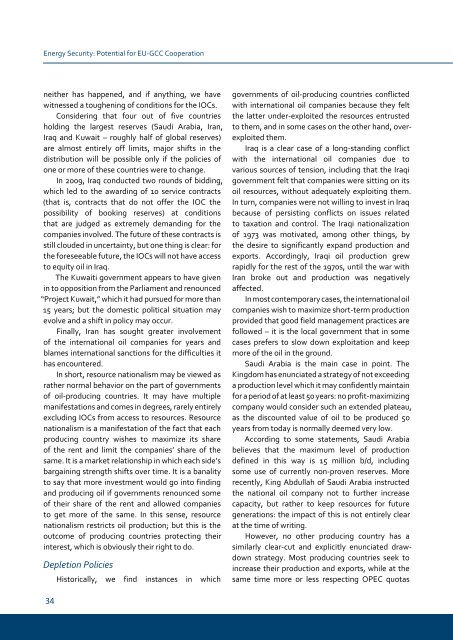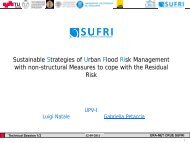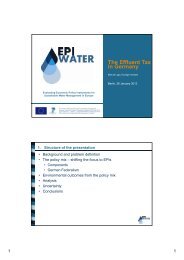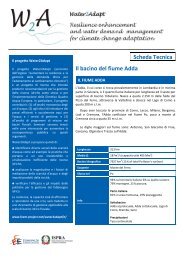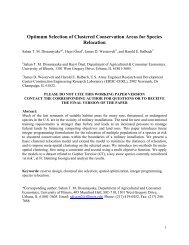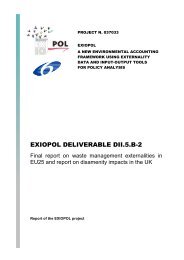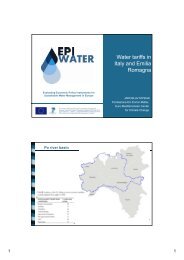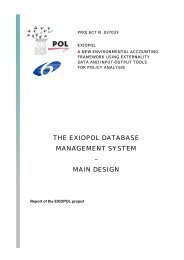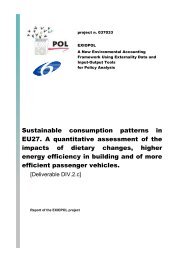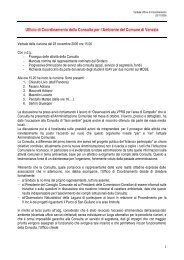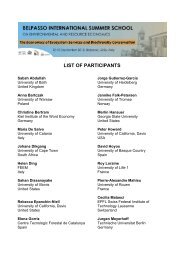Gulf and European Energy Supply Security - Feem-project.net
Gulf and European Energy Supply Security - Feem-project.net
Gulf and European Energy Supply Security - Feem-project.net
Create successful ePaper yourself
Turn your PDF publications into a flip-book with our unique Google optimized e-Paper software.
<strong>Energy</strong> <strong>Security</strong>: Potential for EU-GCC Cooperation<br />
neither has happened, <strong>and</strong> if anything, we have<br />
witnessed a toughening of conditions for the IOCs.<br />
Considering that four out of five countries<br />
holding the largest reserves (Saudi Arabia, Iran,<br />
Iraq <strong>and</strong> Kuwait – roughly half of global reserves)<br />
are almost entirely off limits, major shifts in the<br />
distribution will be possible only if the policies of<br />
one or more of these countries were to change.<br />
In 2009, Iraq conducted two rounds of bidding,<br />
which led to the awarding of 10 service contracts<br />
(that is, contracts that do not offer the IOC the<br />
possibility of booking reserves) at conditions<br />
that are judged as extremely dem<strong>and</strong>ing for the<br />
companies involved. The future of these contracts is<br />
still clouded in uncertainty, but one thing is clear: for<br />
the foreseeable future, the IOCs will not have access<br />
to equity oil in Iraq.<br />
The Kuwaiti government appears to have given<br />
in to opposition from the Parliament <strong>and</strong> renounced<br />
“Project Kuwait,” which it had pursued for more than<br />
15 years; but the domestic political situation may<br />
evolve <strong>and</strong> a shift in policy may occur.<br />
Finally, Iran has sought greater involvement<br />
of the international oil companies for years <strong>and</strong><br />
blames international sanctions for the difficulties it<br />
has encountered.<br />
In short, resource nationalism may be viewed as<br />
rather normal behavior on the part of governments<br />
of oil-producing countries. It may have multiple<br />
manifestations <strong>and</strong> comes in degrees, rarely entirely<br />
excluding IOCs from access to resources. Resource<br />
nationalism is a manifestation of the fact that each<br />
producing country wishes to maximize its share<br />
of the rent <strong>and</strong> limit the companies’ share of the<br />
same. It is a market relationship in which each side’s<br />
bargaining strength shifts over time. It is a banality<br />
to say that more investment would go into finding<br />
<strong>and</strong> producing oil if governments renounced some<br />
of their share of the rent <strong>and</strong> allowed companies<br />
to get more of the same. In this sense, resource<br />
nationalism restricts oil production; but this is the<br />
outcome of producing countries protecting their<br />
interest, which is obviously their right to do.<br />
Depletion Policies<br />
4<br />
Historically, we find instances in which<br />
governments of oil-producing countries conflicted<br />
with international oil companies because they felt<br />
the latter under-exploited the resources entrusted<br />
to them, <strong>and</strong> in some cases on the other h<strong>and</strong>, overexploited<br />
them.<br />
Iraq is a clear case of a long-st<strong>and</strong>ing conflict<br />
with the international oil companies due to<br />
various sources of tension, including that the Iraqi<br />
government felt that companies were sitting on its<br />
oil resources, without adequately exploiting them.<br />
In turn, companies were not willing to invest in Iraq<br />
because of persisting conflicts on issues related<br />
to taxation <strong>and</strong> control. The Iraqi nationalization<br />
of 1973 was motivated, among other things, by<br />
the desire to significantly exp<strong>and</strong> production <strong>and</strong><br />
exports. Accordingly, Iraqi oil production grew<br />
rapidly for the rest of the 1970s, until the war with<br />
Iran broke out <strong>and</strong> production was negatively<br />
affected.<br />
In most contemporary cases, the international oil<br />
companies wish to maximize short-term production<br />
provided that good field management practices are<br />
followed – it is the local government that in some<br />
cases prefers to slow down exploitation <strong>and</strong> keep<br />
more of the oil in the ground.<br />
Saudi Arabia is the main case in point. The<br />
Kingdom has enunciated a strategy of not exceeding<br />
a production level which it may confidently maintain<br />
for a period of at least 50 years: no profit-maximizing<br />
company would consider such an extended plateau,<br />
as the discounted value of oil to be produced 50<br />
years from today is normally deemed very low.<br />
According to some statements, Saudi Arabia<br />
believes that the maximum level of production<br />
defined in this way is 15 million b/d, including<br />
some use of currently non-proven reserves. More<br />
recently, King Abdullah of Saudi Arabia instructed<br />
the national oil company not to further increase<br />
capacity, but rather to keep resources for future<br />
generations: the impact of this is not entirely clear<br />
at the time of writing.<br />
However, no other producing country has a<br />
similarly clear-cut <strong>and</strong> explicitly enunciated drawdown<br />
strategy. Most producing countries seek to<br />
increase their production <strong>and</strong> exports, while at the<br />
same time more or less respecting OPEC quotas


